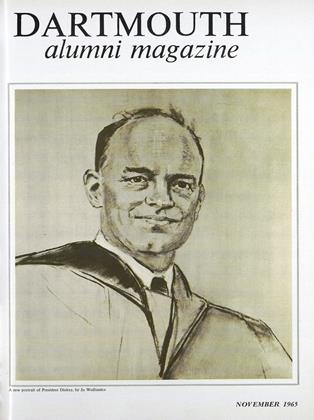ByProf. Michael Choukas '27 (Sociology).Washington, D. C.: Public Affairs Press,1965. 299 pp. $5.00.
I've rarely had an easier or more agreeable assignment in reviewing than this, for the job is all done for me: my friend and colleague "Mike" Choukas has spelled out his aims in detail in his introductory chapter, and another friend, former student, and fellow psychologist Hadley Cantril '28, board chairman of the Institute of International Social Research, tells us in a brief Foreword that his contemporary at Dartmouth has done a very good job of achieving his aims. So be warned: this is a friendly invitation to read a book we find worthy of your attention.
We can all agree with Professor Choukas that "In large part our frustrations and difficulties, as a people and a nation" (to know what is truth and what is fiction) "are due to our relative ignorance about the role of propaganda in these tense and trying times." He addresses himself, here in his classes and to you as readers, to "show its true nature, its techniques, and its relation to democracy for good and for ill." Many examples are drawn from his experience during World War II (N. H. Committee on Morale before the war; Chief of Plans and Production of Morale Operations, in the Office of Strategic Services), especially the Nazi skills - and this is pointed to by Professor Cantril as a service to many who cannot remember World War II and need to learn some of the lessons we learned, the hard way, at that time.
One final tribute, again from Cantril: "This is a scholarly book without being ponderous. It is closely reasoned without being dull. It shows the long history of the use of propaganda in the western world, places propaganda today in its proper historical context, and differentiates the manifest forms of propaganda both of the past and of the present." And so my job is done for me. I could differ a bit with my friend on one point: to me he downgrades all advertising because of the sins of some advertisement, but it's better not to tilt at windmills and be content to recommend the book as one more of a notable series published by the Public Affairs Press and worthy of careful reading and thought.
Professor of Psychology
 View Full Issue
View Full Issue
More From This Issue
-
 Feature
FeatureGraduate Study—Past and Present
November 1965 By PROF. LEONARD M. RIESER '44, -
 Feature
FeatureThe Conscience of Liberal Learning
November 1965 -
 Feature
FeatureAn Exciting 20-Year Forward March
November 1965 -
 Feature
FeatureDartmouth's First Lady
November 1965 By MARGARET BECK McCALLUM -
 Feature
FeatureCHAIRMAN'S REPORT 1964-1965 CAMPAIGN
November 1965 By Rupert C. Thompson, Jr. '28 -
 Feature
FeatureFishing the Grant with John Dickey
November 1965 By EDWARD WEEKS, LITT.D. '50,
CHAUNCEY N. ALLEN '24
-
 Letters to the Editor
Letters to the EditorLetters to the Editor
JAN./FEB. 1980 -
 Class Notes
Class Notes1924's 30th "Best of All"
July 1954 By CHAUNCEY N. ALLEN '24 -
 Books
BooksDOLLARS FOR YOU.
June 1958 By CHAUNCEY N. ALLEN '24 -
 Class Notes
Class NotesThirty-fifth Reunion for 1924
JULY 1959 By CHAUNCEY N. ALLEN '24 -
 Class Notes
Class Notes1924's 40th
JULY 1964 By CHAUNCEY N. ALLEN '24 -
 Books
BooksTHE HUMAN DIMENSION: EXPERIENCES IN POLICY RESEARCH.
MAY 1967 By CHAUNCEY N. ALLEN '24
Books
-
 Books
BooksA Study of Student Life-the Appraisal of Students Traditions
May 1935 -
 Books
BooksSHOCK METAMORPHISM OF NATURAL MATERIALS.
APRIL 1969 By JOHN B. LYONS -
 Books
BooksHOW TO BECOME PRESIDENT
November 1940 By Kenneth A. Robinson -
 Books
BooksTHE PSYCHOLOGY OF BIRDS: AN INTERPRETATION OF BIRD BEHAVIOR.
JUNE 1967 By LAWRENCE KILHAM, M.D. -
 Books
BooksTHE SIOUX, Life and Customs of a Warrior Society.
JULY 1964 By ROBERT A. McKENNAN '25 -
 Books
BooksTHREE BOOKS ON RELIGION. RELIGION
APRIL 1930 By William Kelley Wright

